An Analysis of Sustainable Tourism and Its Key Components: An Essay
VerifiedAdded on 2021/04/19
|5
|1683
|64
Essay
AI Summary
This essay explores the concept of sustainable tourism and its various components. It begins by introducing the term and its significance in addressing the negative impacts of traditional tourism, such as environmental degradation and overuse of resources. The essay then delves into four key components of sustainable tourism: ecotourism, geotourism, responsible tourism, and cultural tourism. Ecotourism is presented as a crucial element, particularly in developing countries, offering alternative livelihood opportunities while preserving natural environments. Geotourism, a more recent concept, is discussed in terms of its focus on geological landscapes and the promotion of geo-conservation. Responsible tourism is defined as respecting the environment, local communities, and cultural heritage, while cultural tourism is examined for its role in highlighting culturally significant sites and events. The essay concludes by emphasizing the importance of sustainable tourism in destination branding and promoting responsible practices to minimize environmental impact and maximize community benefits.
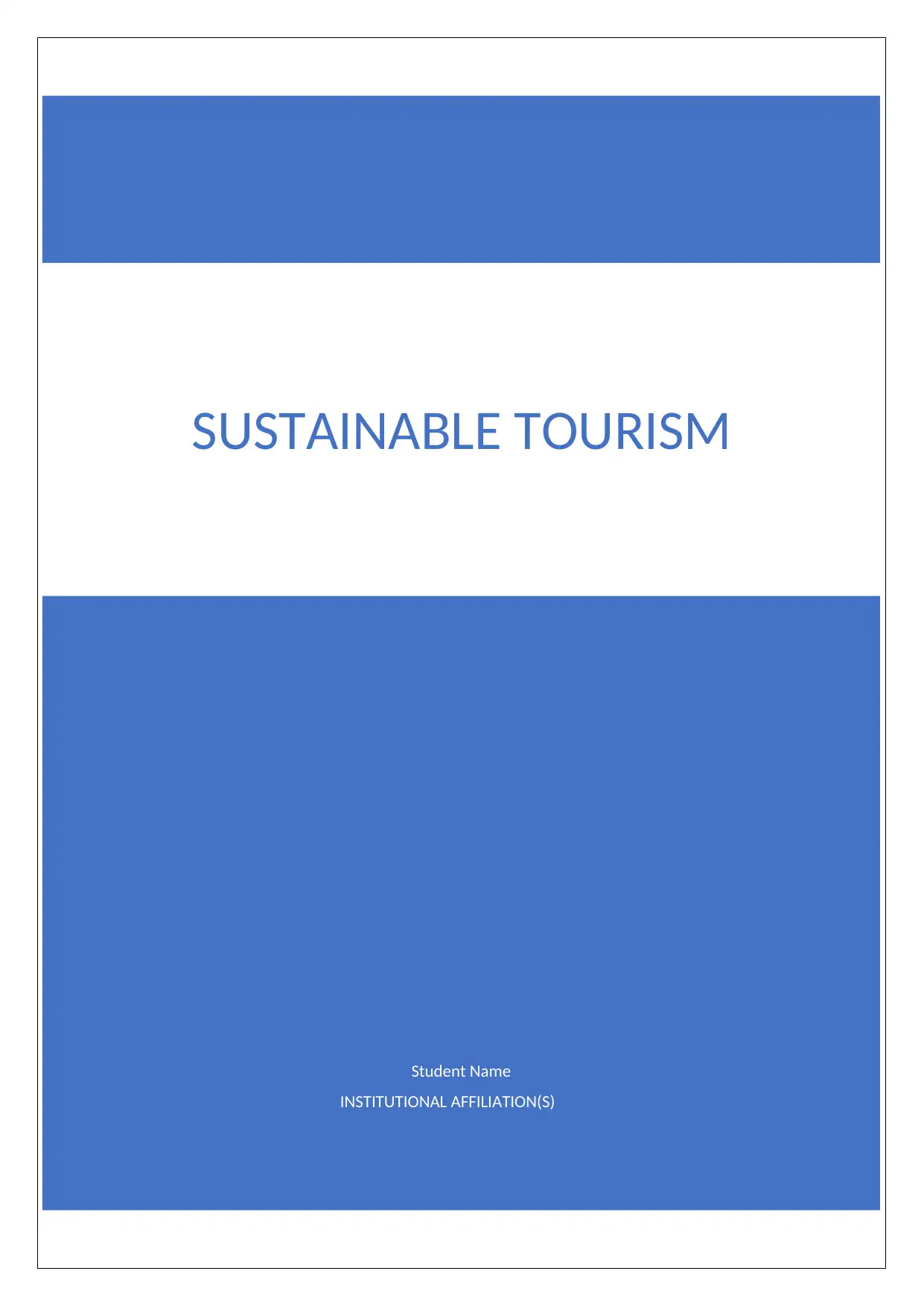
Student Name
INSTITUTIONAL AFFILIATION(S)
SUSTAINABLE TOURISM
INSTITUTIONAL AFFILIATION(S)
SUSTAINABLE TOURISM
Paraphrase This Document
Need a fresh take? Get an instant paraphrase of this document with our AI Paraphraser
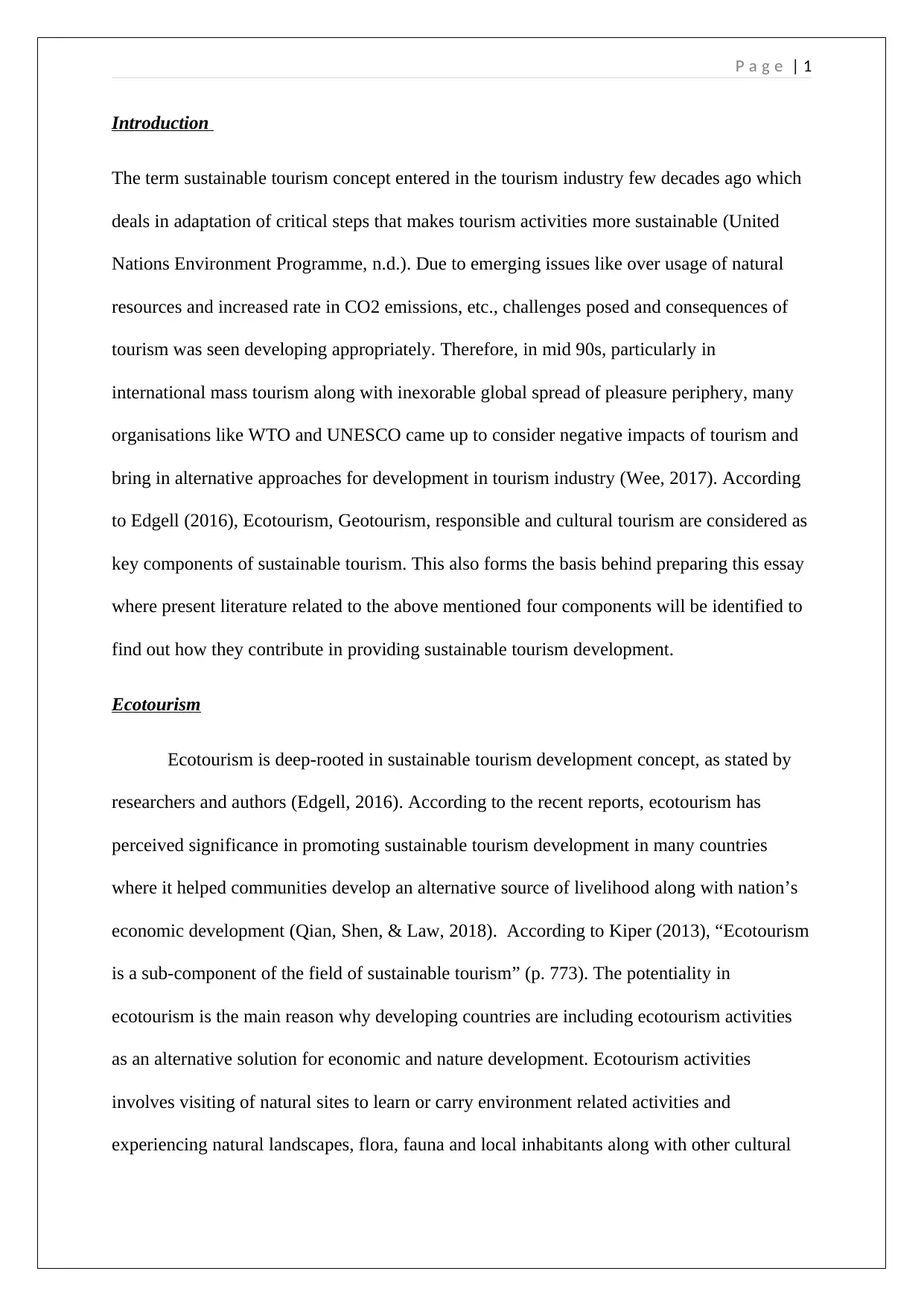
P a g e | 1
Introduction
The term sustainable tourism concept entered in the tourism industry few decades ago which
deals in adaptation of critical steps that makes tourism activities more sustainable (United
Nations Environment Programme, n.d.). Due to emerging issues like over usage of natural
resources and increased rate in CO2 emissions, etc., challenges posed and consequences of
tourism was seen developing appropriately. Therefore, in mid 90s, particularly in
international mass tourism along with inexorable global spread of pleasure periphery, many
organisations like WTO and UNESCO came up to consider negative impacts of tourism and
bring in alternative approaches for development in tourism industry (Wee, 2017). According
to Edgell (2016), Ecotourism, Geotourism, responsible and cultural tourism are considered as
key components of sustainable tourism. This also forms the basis behind preparing this essay
where present literature related to the above mentioned four components will be identified to
find out how they contribute in providing sustainable tourism development.
Ecotourism
Ecotourism is deep-rooted in sustainable tourism development concept, as stated by
researchers and authors (Edgell, 2016). According to the recent reports, ecotourism has
perceived significance in promoting sustainable tourism development in many countries
where it helped communities develop an alternative source of livelihood along with nation’s
economic development (Qian, Shen, & Law, 2018). According to Kiper (2013), “Ecotourism
is a sub-component of the field of sustainable tourism” (p. 773). The potentiality in
ecotourism is the main reason why developing countries are including ecotourism activities
as an alternative solution for economic and nature development. Ecotourism activities
involves visiting of natural sites to learn or carry environment related activities and
experiencing natural landscapes, flora, fauna and local inhabitants along with other cultural
Introduction
The term sustainable tourism concept entered in the tourism industry few decades ago which
deals in adaptation of critical steps that makes tourism activities more sustainable (United
Nations Environment Programme, n.d.). Due to emerging issues like over usage of natural
resources and increased rate in CO2 emissions, etc., challenges posed and consequences of
tourism was seen developing appropriately. Therefore, in mid 90s, particularly in
international mass tourism along with inexorable global spread of pleasure periphery, many
organisations like WTO and UNESCO came up to consider negative impacts of tourism and
bring in alternative approaches for development in tourism industry (Wee, 2017). According
to Edgell (2016), Ecotourism, Geotourism, responsible and cultural tourism are considered as
key components of sustainable tourism. This also forms the basis behind preparing this essay
where present literature related to the above mentioned four components will be identified to
find out how they contribute in providing sustainable tourism development.
Ecotourism
Ecotourism is deep-rooted in sustainable tourism development concept, as stated by
researchers and authors (Edgell, 2016). According to the recent reports, ecotourism has
perceived significance in promoting sustainable tourism development in many countries
where it helped communities develop an alternative source of livelihood along with nation’s
economic development (Qian, Shen, & Law, 2018). According to Kiper (2013), “Ecotourism
is a sub-component of the field of sustainable tourism” (p. 773). The potentiality in
ecotourism is the main reason why developing countries are including ecotourism activities
as an alternative solution for economic and nature development. Ecotourism activities
involves visiting of natural sites to learn or carry environment related activities and
experiencing natural landscapes, flora, fauna and local inhabitants along with other cultural
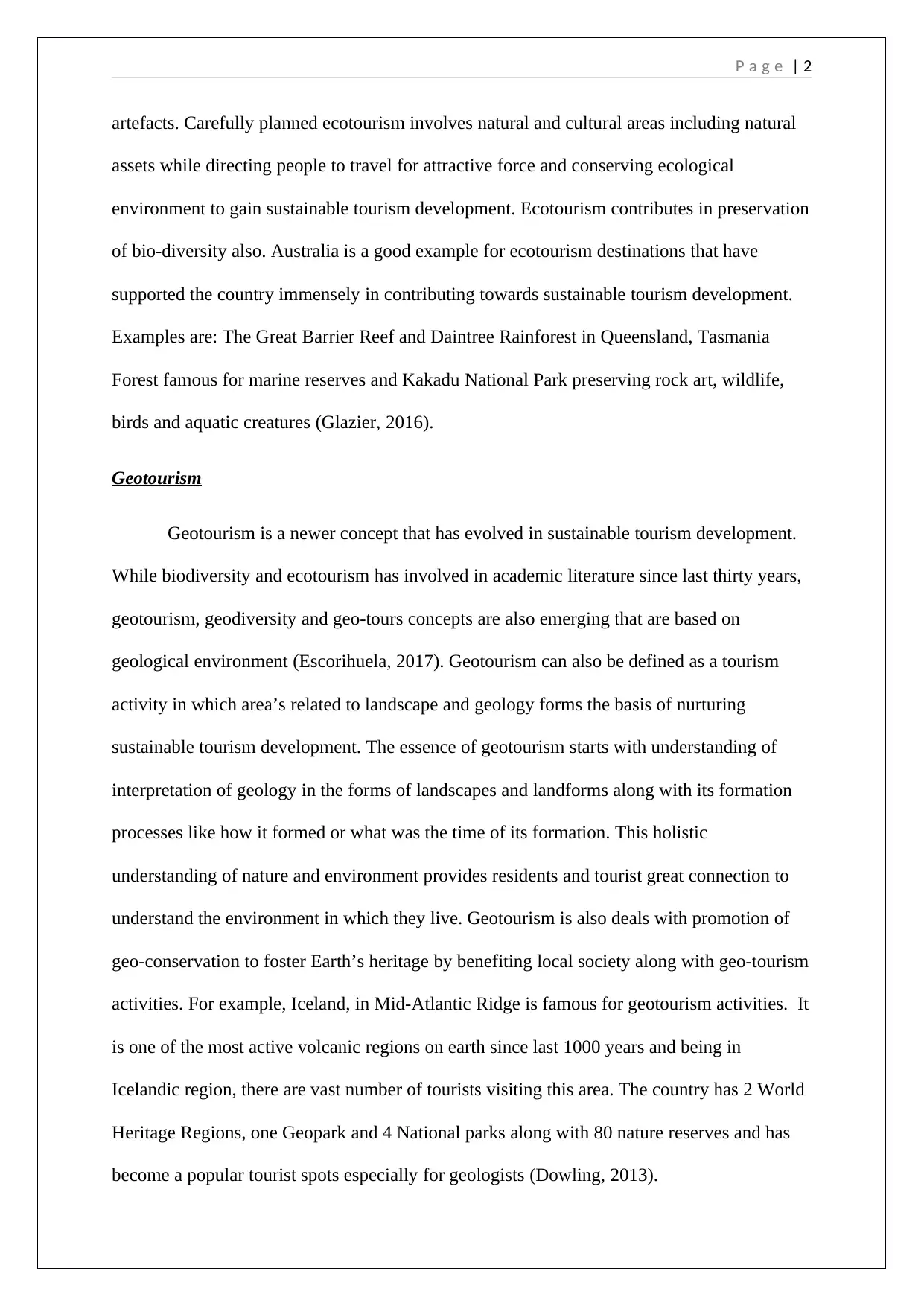
P a g e | 2
artefacts. Carefully planned ecotourism involves natural and cultural areas including natural
assets while directing people to travel for attractive force and conserving ecological
environment to gain sustainable tourism development. Ecotourism contributes in preservation
of bio-diversity also. Australia is a good example for ecotourism destinations that have
supported the country immensely in contributing towards sustainable tourism development.
Examples are: The Great Barrier Reef and Daintree Rainforest in Queensland, Tasmania
Forest famous for marine reserves and Kakadu National Park preserving rock art, wildlife,
birds and aquatic creatures (Glazier, 2016).
Geotourism
Geotourism is a newer concept that has evolved in sustainable tourism development.
While biodiversity and ecotourism has involved in academic literature since last thirty years,
geotourism, geodiversity and geo-tours concepts are also emerging that are based on
geological environment (Escorihuela, 2017). Geotourism can also be defined as a tourism
activity in which area’s related to landscape and geology forms the basis of nurturing
sustainable tourism development. The essence of geotourism starts with understanding of
interpretation of geology in the forms of landscapes and landforms along with its formation
processes like how it formed or what was the time of its formation. This holistic
understanding of nature and environment provides residents and tourist great connection to
understand the environment in which they live. Geotourism is also deals with promotion of
geo-conservation to foster Earth’s heritage by benefiting local society along with geo-tourism
activities. For example, Iceland, in Mid-Atlantic Ridge is famous for geotourism activities. It
is one of the most active volcanic regions on earth since last 1000 years and being in
Icelandic region, there are vast number of tourists visiting this area. The country has 2 World
Heritage Regions, one Geopark and 4 National parks along with 80 nature reserves and has
become a popular tourist spots especially for geologists (Dowling, 2013).
artefacts. Carefully planned ecotourism involves natural and cultural areas including natural
assets while directing people to travel for attractive force and conserving ecological
environment to gain sustainable tourism development. Ecotourism contributes in preservation
of bio-diversity also. Australia is a good example for ecotourism destinations that have
supported the country immensely in contributing towards sustainable tourism development.
Examples are: The Great Barrier Reef and Daintree Rainforest in Queensland, Tasmania
Forest famous for marine reserves and Kakadu National Park preserving rock art, wildlife,
birds and aquatic creatures (Glazier, 2016).
Geotourism
Geotourism is a newer concept that has evolved in sustainable tourism development.
While biodiversity and ecotourism has involved in academic literature since last thirty years,
geotourism, geodiversity and geo-tours concepts are also emerging that are based on
geological environment (Escorihuela, 2017). Geotourism can also be defined as a tourism
activity in which area’s related to landscape and geology forms the basis of nurturing
sustainable tourism development. The essence of geotourism starts with understanding of
interpretation of geology in the forms of landscapes and landforms along with its formation
processes like how it formed or what was the time of its formation. This holistic
understanding of nature and environment provides residents and tourist great connection to
understand the environment in which they live. Geotourism is also deals with promotion of
geo-conservation to foster Earth’s heritage by benefiting local society along with geo-tourism
activities. For example, Iceland, in Mid-Atlantic Ridge is famous for geotourism activities. It
is one of the most active volcanic regions on earth since last 1000 years and being in
Icelandic region, there are vast number of tourists visiting this area. The country has 2 World
Heritage Regions, one Geopark and 4 National parks along with 80 nature reserves and has
become a popular tourist spots especially for geologists (Dowling, 2013).
⊘ This is a preview!⊘
Do you want full access?
Subscribe today to unlock all pages.

Trusted by 1+ million students worldwide
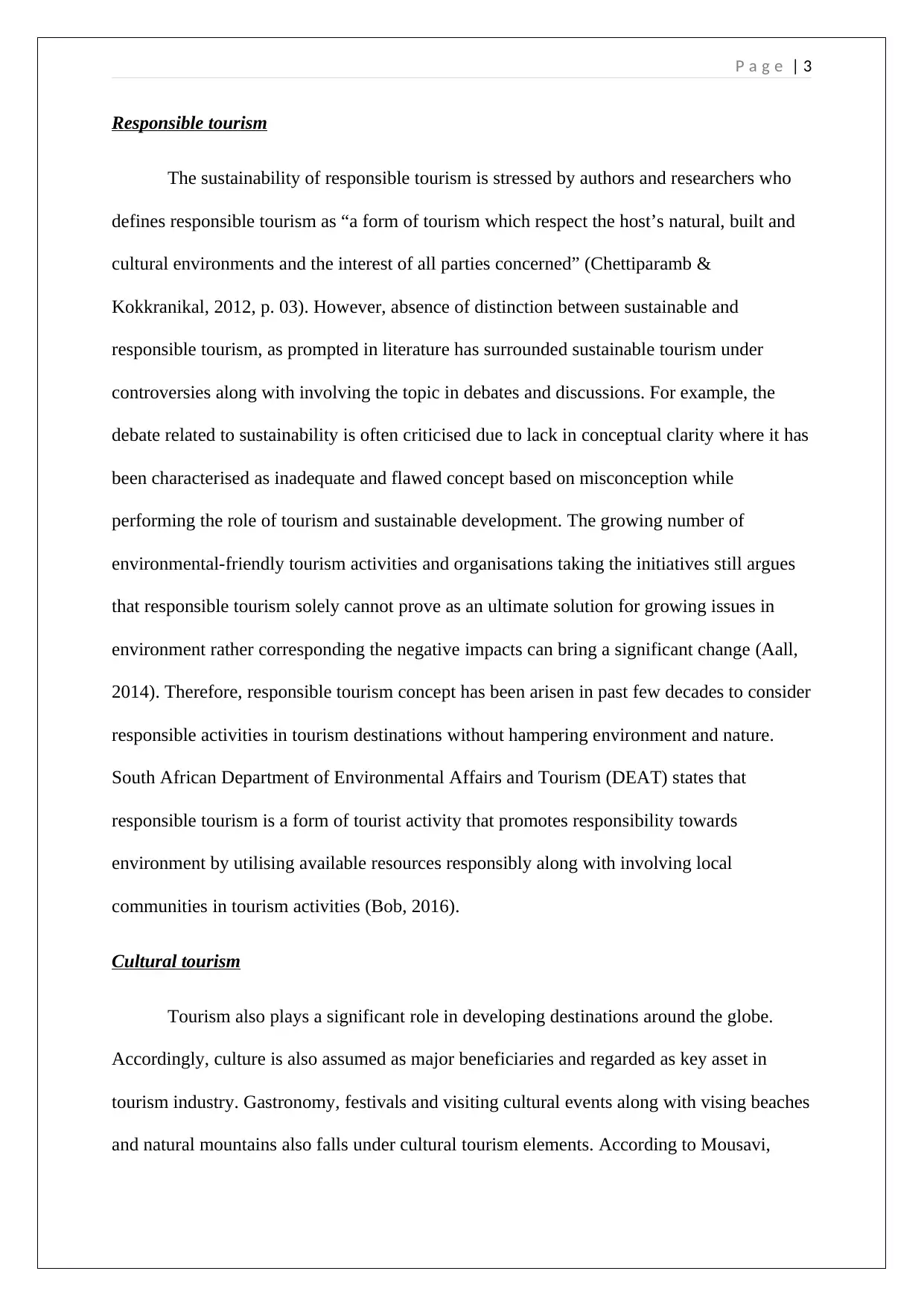
P a g e | 3
Responsible tourism
The sustainability of responsible tourism is stressed by authors and researchers who
defines responsible tourism as “a form of tourism which respect the host’s natural, built and
cultural environments and the interest of all parties concerned” (Chettiparamb &
Kokkranikal, 2012, p. 03). However, absence of distinction between sustainable and
responsible tourism, as prompted in literature has surrounded sustainable tourism under
controversies along with involving the topic in debates and discussions. For example, the
debate related to sustainability is often criticised due to lack in conceptual clarity where it has
been characterised as inadequate and flawed concept based on misconception while
performing the role of tourism and sustainable development. The growing number of
environmental-friendly tourism activities and organisations taking the initiatives still argues
that responsible tourism solely cannot prove as an ultimate solution for growing issues in
environment rather corresponding the negative impacts can bring a significant change (Aall,
2014). Therefore, responsible tourism concept has been arisen in past few decades to consider
responsible activities in tourism destinations without hampering environment and nature.
South African Department of Environmental Affairs and Tourism (DEAT) states that
responsible tourism is a form of tourist activity that promotes responsibility towards
environment by utilising available resources responsibly along with involving local
communities in tourism activities (Bob, 2016).
Cultural tourism
Tourism also plays a significant role in developing destinations around the globe.
Accordingly, culture is also assumed as major beneficiaries and regarded as key asset in
tourism industry. Gastronomy, festivals and visiting cultural events along with vising beaches
and natural mountains also falls under cultural tourism elements. According to Mousavi,
Responsible tourism
The sustainability of responsible tourism is stressed by authors and researchers who
defines responsible tourism as “a form of tourism which respect the host’s natural, built and
cultural environments and the interest of all parties concerned” (Chettiparamb &
Kokkranikal, 2012, p. 03). However, absence of distinction between sustainable and
responsible tourism, as prompted in literature has surrounded sustainable tourism under
controversies along with involving the topic in debates and discussions. For example, the
debate related to sustainability is often criticised due to lack in conceptual clarity where it has
been characterised as inadequate and flawed concept based on misconception while
performing the role of tourism and sustainable development. The growing number of
environmental-friendly tourism activities and organisations taking the initiatives still argues
that responsible tourism solely cannot prove as an ultimate solution for growing issues in
environment rather corresponding the negative impacts can bring a significant change (Aall,
2014). Therefore, responsible tourism concept has been arisen in past few decades to consider
responsible activities in tourism destinations without hampering environment and nature.
South African Department of Environmental Affairs and Tourism (DEAT) states that
responsible tourism is a form of tourist activity that promotes responsibility towards
environment by utilising available resources responsibly along with involving local
communities in tourism activities (Bob, 2016).
Cultural tourism
Tourism also plays a significant role in developing destinations around the globe.
Accordingly, culture is also assumed as major beneficiaries and regarded as key asset in
tourism industry. Gastronomy, festivals and visiting cultural events along with vising beaches
and natural mountains also falls under cultural tourism elements. According to Mousavi,
Paraphrase This Document
Need a fresh take? Get an instant paraphrase of this document with our AI Paraphraser
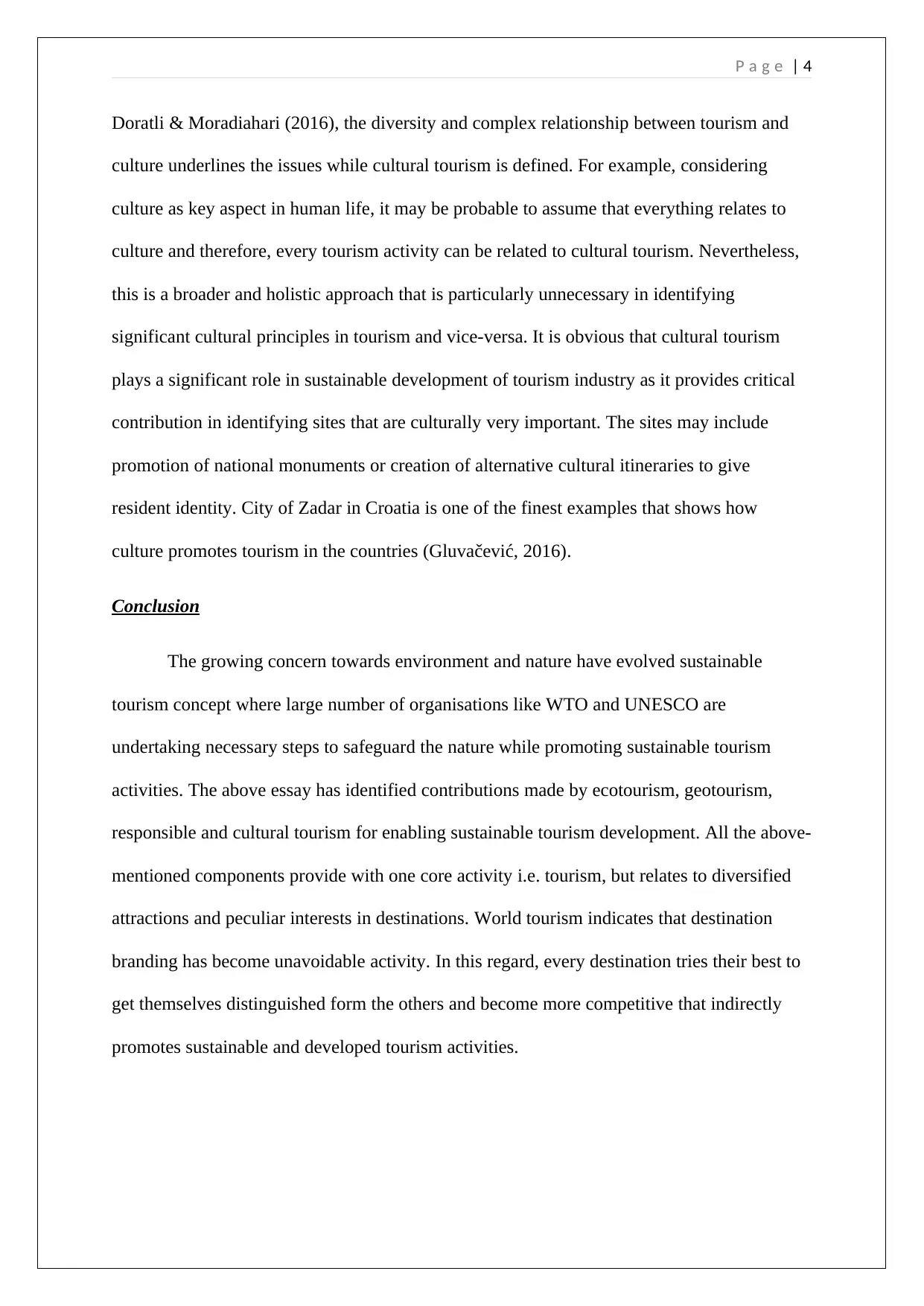
P a g e | 4
Doratli & Moradiahari (2016), the diversity and complex relationship between tourism and
culture underlines the issues while cultural tourism is defined. For example, considering
culture as key aspect in human life, it may be probable to assume that everything relates to
culture and therefore, every tourism activity can be related to cultural tourism. Nevertheless,
this is a broader and holistic approach that is particularly unnecessary in identifying
significant cultural principles in tourism and vice-versa. It is obvious that cultural tourism
plays a significant role in sustainable development of tourism industry as it provides critical
contribution in identifying sites that are culturally very important. The sites may include
promotion of national monuments or creation of alternative cultural itineraries to give
resident identity. City of Zadar in Croatia is one of the finest examples that shows how
culture promotes tourism in the countries (Gluvačević, 2016).
Conclusion
The growing concern towards environment and nature have evolved sustainable
tourism concept where large number of organisations like WTO and UNESCO are
undertaking necessary steps to safeguard the nature while promoting sustainable tourism
activities. The above essay has identified contributions made by ecotourism, geotourism,
responsible and cultural tourism for enabling sustainable tourism development. All the above-
mentioned components provide with one core activity i.e. tourism, but relates to diversified
attractions and peculiar interests in destinations. World tourism indicates that destination
branding has become unavoidable activity. In this regard, every destination tries their best to
get themselves distinguished form the others and become more competitive that indirectly
promotes sustainable and developed tourism activities.
Doratli & Moradiahari (2016), the diversity and complex relationship between tourism and
culture underlines the issues while cultural tourism is defined. For example, considering
culture as key aspect in human life, it may be probable to assume that everything relates to
culture and therefore, every tourism activity can be related to cultural tourism. Nevertheless,
this is a broader and holistic approach that is particularly unnecessary in identifying
significant cultural principles in tourism and vice-versa. It is obvious that cultural tourism
plays a significant role in sustainable development of tourism industry as it provides critical
contribution in identifying sites that are culturally very important. The sites may include
promotion of national monuments or creation of alternative cultural itineraries to give
resident identity. City of Zadar in Croatia is one of the finest examples that shows how
culture promotes tourism in the countries (Gluvačević, 2016).
Conclusion
The growing concern towards environment and nature have evolved sustainable
tourism concept where large number of organisations like WTO and UNESCO are
undertaking necessary steps to safeguard the nature while promoting sustainable tourism
activities. The above essay has identified contributions made by ecotourism, geotourism,
responsible and cultural tourism for enabling sustainable tourism development. All the above-
mentioned components provide with one core activity i.e. tourism, but relates to diversified
attractions and peculiar interests in destinations. World tourism indicates that destination
branding has become unavoidable activity. In this regard, every destination tries their best to
get themselves distinguished form the others and become more competitive that indirectly
promotes sustainable and developed tourism activities.
1 out of 5
Related Documents
Your All-in-One AI-Powered Toolkit for Academic Success.
+13062052269
info@desklib.com
Available 24*7 on WhatsApp / Email
![[object Object]](/_next/static/media/star-bottom.7253800d.svg)
Unlock your academic potential
Copyright © 2020–2026 A2Z Services. All Rights Reserved. Developed and managed by ZUCOL.





